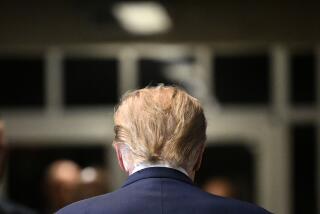Even If You Dress It Up, a Kangaroo Is Still a Kangaroo
This week, as early as today, the Bush administration will release the long-awaited rules for its new military tribunals. The rules contain some significant changes. Officials hope that these concessions will convince reluctant allies and critics that this is not the “kangaroo court” that has been portrayed worldwide. However, these concessions do little to change the structure of the tribunal as a makeshift court designed to produce predictable convictions.
Ultimately, a court is no better than the material used to construct it. The administration can add any number of stylish additions, but even all of the lawyers in the government cannot make an unconstitutional sow’s ear into a constitutional silk purse.
It is important to recognize that the new rules make significant strides in addressing some of the most outrageous aspects of the executive order issued in November. The administration has now agreed to require proof beyond a reasonable doubt as the standard for conviction. It will allow for a type of appeal. While it will still allow conviction by a majority vote, it will require unanimity to impose the death penalty. It will hold trials in open court whenever possible.
Some of these rules, however, raise more questions than they answer. The administration previously insisted that it needed an alternative to the federal courts because of security concerns. However, the new rules largely mirror the federal courts on rules governing nonpublic proceedings and the use of classified evidence. The main differences between the federal and tribunal rules are in those areas that will help secure convictions rather than secrets.
It is clear that the new rules were written by prosecutors to govern their own prosecutions. The biggest changes are in areas that prosecutors find inconvenient, such as proving that evidence is authentic before using it. Accordingly, tribunal prosecutors will not have to “authenticate” evidence or even show a chain of custody. Evidence that would be struck as unreliable in federal court can be introduced in these tribunals.
Likewise, the bane of every prosecutor’s case is the threat of the appellate court, which tends to be less inhibited in standing up to the executive branch. Accordingly, the new rules bar appeal to a real federal judge. Instead, the administration will handpick willing individuals to serve as ad hoc appellate judges. Just in case of any misguided sense of justice, these judges will be limited to reviewing cases under the rules set by the administration and will not be permitted to apply the U.S. Constitution or federal law. This creates the mere pretense of legal process.
Finally, the rules effectively bar experienced civilian defense lawyers from representing these defendants. It is always possible that, even in the most rigged match, a good defense lawyer can prevail. The defendants can have military defense counsel but must pay for any civilian counsel--an unlikely prospect for some Talib who is wearing the full extent of his personal wealth on his back.
Military defense counsel long have been criticized as inexperienced and often dominated by higher-ranking officers. Moreover, imposing uniformed counsel on these prisoners will inevitably chill attorney-client communications, given the defendants’ alleged recent efforts to kill people wearing the same uniform.
These rules leave the president in a role more reminiscent of a Caesar than a civil servant. With a gesture, the president can send a defendant to a real trial or a makeshift trial. Some defendants such as Zacarias Moussaoui will be sent to federal court to receive a full trial with paid civilian counsel. Others will be sent back to their own countries. And some will be sent to Cuba and the tribunals.
This is not what our framers had in mind. Although it is true that the Supreme Court generally has not applied constitutional protections to foreign nationals outside our borders, the new tribunal raises a new and fundamental challenge to the separation of powers. President Bush has asserted the right to create a wholly independent judicial system. Not only will the president maintain his own courts but presumably his own prisons. The assertion of such authority by a president is dangerous and alien to our system.
The framers expressly denied the president the right to create and mete out his own form of justice. They created a carefully balanced government of checks and balances, including an independent judiciary. They gave the right to create “inferior courts” exclusively to Congress. Yet the administration has steadfastly refused to ask for the creation of such a court despite the willingness of many members to consider it.
It takes more than a few rule changes to remove the “kangaroo” from the court. One can shampoo and pedicure a kangaroo but it does little to change the appearance of a president’s own private menagerie of justice.
*
Jonathan Turley is a constitutional law professor at George Washington University and has served as counsel in national security cases in both federal and military courts.
More to Read
Sign up for Essential California
The most important California stories and recommendations in your inbox every morning.
You may occasionally receive promotional content from the Los Angeles Times.










